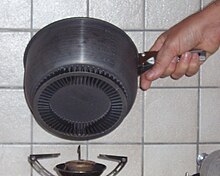Billycan

A billycan, more commonly known simply as a billy or occasionally as a billy can (billy tin or billy pot in Canada), is a lightweight cooking pot which is used on a campfire or a camping stove.
Usage and etymology of the term

The term billy or billycan is particularly associated with Australian usage, but is also used in the UK and Ireland.[1] Elsewhere, there is no special term for a pot designed for camping use.
It is widely accepted that the term "billycan" is derived from the large cans used for transporting bouilli or bully beef on Australia-bound ships or during exploration of the outback, which after use were modified for boiling water over a fire;[2][3] however there is a suggestion that the word may be associated with the Aboriginal billa (meaning water; cf. Billabong).[4]
In Australia, the billy has come to symbolise the spirit of exploration of the outback. To boil the billy most often means to make tea. "Billy Tea" is the name of a popular brand of tea long sold in Australian grocers and supermarkets.[5] Billies feature in many of Henry Lawson's stories and poems. Banjo Paterson's most famous of many references to the billy is surely in the first verse and chorus of Waltzing Matilda: "And he sang as he looked at the old billy boiling", which was later changed by the Billy Tea Company to "And he sang as he watched and waited 'til his billy boiled...".[5]
Modern billies

In recent years, conscious of the important role played by billies in lightweight backpacking and mountaineering, much research and innovation has gone into improving their design and performance. Issues include:
- Weight: Billies are typically made from aluminium, stainless steel or titanium,.[6] Handles are often omitted.
- Durability: Aluminium billies may be easily dented. Quality billies are often made from either stronger materials or protected by hard anodised surfaces.
- Thermal efficiency: In order to save fuel and speed-up cooking, some modern billies have heatsinks integrated into their bases. It is also possible to buy separate heatsinks, which may be wrapped around the pot.[7] These heatsinks channel much of the heat into the pot that would otherwise escape around the sides of the pot.
- Packability: Billies are often sold in nesting sets and the inner billy is often used to store the stove or other items. To aid in nesting, handles may be removable, hinged or omitted.
- Versatility: Frying pan shaped billies may be used as lids and lids may be used as plates. Small pots may be used as drinking mugs.
- Ease of use: Non-stick finishes are common, to make cooking and cleaning easier.
- Weatherproofing: Some manufacturers produce "integrated cooking systems" consisting of one or more pots and a stove, designed to work as a wind-resistant integrated unit. Trangia, and more recently Jetboil,[8] are well-known examples of this.
General-purpose pot handles, often called billy-grips, can be bought separately or may be supplied with a set of billies. These have a hinged pliers-like construction and may be used to grip almost any pot with a lipped rim. The term "spondonicle" has also been applied to these handles, by some Australian users.[9]
See also
References
- ^ Sceilig: Information Pack for Troops (p. 4) and The Patrol goes to Camp (pp. 9, 11)
- ^ "'Swinging the Billycan' - Making Tea in the Australian Bush". BBC. 2003-01-22. Retrieved 2007-02-16.
- ^ "The Manning Index of South Australian History". State Library of South Australia. Retrieved 2009-07-11.
- ^ Oxford English Dictionary
- ^ a b James Parsons (2009-02-05). "Waltzing Matilda - Brand Marketing for Billy Tea". suite101.com. Retrieved 2009-07-11.
- ^ "Does Titanium Cookware Get The Nod?". hiking-gear-and-equipment-used-for-camping.com. 2004. Retrieved 2009-07-11.
- ^ "Heat Exchanger". MSR. Retrieved 2009-07-12.
- ^ Jeremy R. Laporte (2009-01-15). "Jetboil Personal Cooking System: Owner Review". backpackgeartest.org. Retrieved 2009-09-06.
- ^ Roger Caffin (2002-03-01). "FAQ - Cooking and Food". Confederation of Bushwalking Clubs NSW. Retrieved 2009-09-06.
